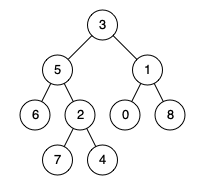1676. Lowest Common Ancestor of a Binary Tree IV
1676. Lowest Common Ancestor of a Binary Tree IV
Description
Difficulty: Medium
Related Topics: Tree, Depth-First Search, Binary Tree
Given the root of a binary tree and an array of TreeNode objects nodes, return the lowest common ancestor (LCA) of all the nodes in nodes. All the nodes will exist in the tree, and all values of the tree’s nodes are unique.
Extending the definition of LCA on Wikipedia: “The lowest common ancestor of n nodes p1, p2, …, pn in a binary tree T is the lowest node that has every pi as a descendant (where we allow a node to be a descendant of itself) for every valid i“. A descendant of a node x is a node y that is on the path from node x to some leaf node.
Example 1:

1 | Input: root = [3,5,1,6,2,0,8,null,null,7,4], nodes = [4,7] |
Example 2:

1 | Input: root = [3,5,1,6,2,0,8,null,null,7,4], nodes = [1] |
Example 3:

1 | Input: root = [3,5,1,6,2,0,8,null,null,7,4], nodes = [7,6,2,4] |
Constraints:
- The number of nodes in the tree is in the range [1, 104].
- -109 <= Node.val <= 109
- All
Node.valare unique. - All
nodes[i]will exist in the tree. - All
nodes[i]are distinct.
Hints/Notes
- Since every node exists, we can just return when we find the first item in the list
- Provided an array of nodes, but it’s the same as finding the LCA of two nodes
Solution
Language: C++
1 | /** |